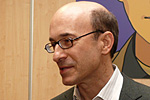Ken Rogoff on chess addiction and why he had to give up the game
Kenneth Saul Rogoff is the Thomas D. Cabot Professor of Public Policy and Professor of Economics at Harvard University. He has served as an economist at the International Monetary Fund (IMF), and at the Board of Governors of the Federal Reserve System, and has also been an advisor on the team of a recent presidential candidate.
As a former chess grandmaster, who at the height of this career he was ranked number forty in the world, Ken has not been able to abandon his love of the game. Last year and this year again he visited the London Chess Classic, and in fact even joined in the live commentary of games. In the VIP room he was consulted by practically everbody, especially at a time when the world economy seems to be in serious trouble and the European monetary union on the verge of collapse.

Rogoff explaining things to GM Nigel Short and Pakistani women's champion
Dr. (Med.) Nida Siddiqui, who was playing in the Open

On the free day the sponsor give a private dinner for special guests: organiser Malcolm Pein,
Ken Rogoff, sponsor Peter Davies, Garry Kasparov and Natasha Rogoff, a film producer in New York

Every year Harvard Economics Professor Ken Rogoff says he recieves an unsolicited letter from one of the world's top chess players. It is a different one every year but the question is the same: how can I get out of chess.
Because Ken Rogoff is one of those exceptional people who has managed to excel not just in one field but in two.
Professor Rogoff has been chief economist at the IMF, he's worked the Federal Reserve, but he had a life before economics. As a child Ken developed an all-consuming passion for chess. He left home - and school - at 15 to pursue this passion and he did very well indeed. He became an international grand master -- the highest title in chess and was once ranked 40th in the World.
Justin Rowlatt asks Ken Rogoff why was forced to decide to stop playing the game he loved.
Other recent stories
-
Newsmax: Harvard’s Rogoff: Gold Sales Won’t Solve Europe’s Woes
It has been suggested that European governments unload some of their massive gold holdings to shore up their shaky finances. So what does Harvard economics professor Kenneth Rogoff, who has studied official gold reserves, think of the idea? It’s a no go, he says. First and foremost, they don’t have enough gold to do the trick. A few statistics are telling. In Greece, government debt totals 143 percent of GDP, while gold amounts to 2 percent of GDP. In Italy, it’s 119 percent for debt and 7 percent for gold. In Spain, it’s 60 percent for debt and 11 percent for GDP.
-
Rogoff: Is capitalism sustainable? (reproduced in CNN)
"I am often asked if the recent global financial crisis marks the beginning of the end of modern capitalism. It is a curious question, because it seems to presume that there is a viable replacement waiting in the wings. The truth of the matter is that, for now at least, the only serious alternatives to today’s dominant Anglo-American paradigm are other forms of capitalism."
-
Rogoff: Technology and Inequality – parallels in chess
When a leading economic thinker happens to also be a strong chess grandmaster, his explanations of financial matters tend to draw allegories from the game he loves. Prof. Kenneth Rogoff periodically sets out his views in TV interviews and newspaper columns. Here is one from Project Syndicate that has appeared in many news sites. Includes a warm birthday greetings to ChessBase.
-
Grandmasters and Global Growth
Professor Kenneth Rogoff is a strong chess grandmaster, who also happens to be one of the world's leading economists. In a Project Syndicate article that appeared this week Ken sees the new decade as one in which "artificial intelligence hits escape velocity," with an economic impact on par with the emergence of India and China. He uses computer chess to illustrated the point.
-
Rogoff: Things are not going to get better soon
Are you baffled by the global financial crisis? Are the contradictory statements put out by various experts confusing you? Then listen to this interview with one of the world's leading economists, Kenneth S. Rogoff, who very lucidly explains the current situation, its causes and its possible remedies. Ken is also a chess grandmaster, and in 1972 he played a jewel of a game.



























